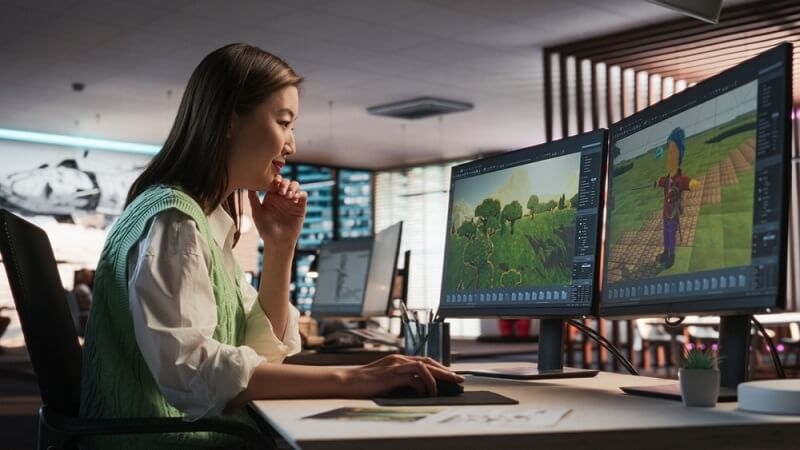
For the longest time, people thought of gaming as a distraction. Something to kill time after school, a weekend hobby, maybe even a guilty pleasure. But anyone who’s ever lost themselves in a game knows better. Gaming has always been about more than points, levels, or beating the final boss. It’s about storytelling, world-building, visuals that stick in your head long after you log off. And now, those same worlds are making the leap from screen to canvas.
This is where pixels meet paint, where digital heroes inspire brushes, and where gamers start calling themselves artists. It’s not just a quirky little movement—it’s a full-on shift. People are turning consoles into studios, streaming setups into creative spaces, and passion into income. Some call it the rise of the gaming art business.
Games are already art, if we’re being honest. Every background, every soundtrack, every character design—someone poured hours into making it look and feel the way it does. When you’ve spent nights exploring a fantasy world or battling your way through futuristic cities, it’s only natural to want to capture that feeling in a way that lasts.
That’s where gaming art prints come in. They’re not just posters; they’re souvenirs of experiences. They hang on walls like a memory made permanent.
Most of the artists you see online today didn’t start out thinking they’d run businesses. They were doodling in notebooks, sketching fan art for fun, or modding their favorite game because the default design wasn’t “cool enough.” Slowly, friends started asking for commissions. Strangers began sharing their work. And then it hit them: maybe this could be something more.
That’s the essence of it—you can turn gaming passion into business without even realizing it at first. It starts as love. Then, with a little persistence, it becomes livelihood.

Here’s the advantage gamers already have: the tools. High-powered PCs, tablets, design software—they’re second nature to most players. If you’re already editing overlays for Twitch, tweaking Photoshop for your thumbnails, or building custom mods, you’ve got a head start.
This is why people talk about the tech to art entrepreneur. They’re not starting from scratch. They’re adapting skills they already have, adding a creative spin, and suddenly they’re not just players anymore—they’re makers.
The question I hear a lot is: how to start art business gaming? The truth? You don’t need a huge plan on day one. Start small:
Post sketches on Instagram or Twitter.
Upload a digital file to Etsy.
Print a handful of posters at a local shop.
Offer to draw someone’s in-game avatar for a few bucks.
That’s it. No grand launch, no massive overhead. The key is sharing your work, even when you’re not sure it’s “good enough.” Because chances are, someone out there will connect with it.
Gamers love to collect, show off, and celebrate their passions. That makes the gaming community one of the most supportive audiences for art. Walk through a convention artist alley and you’ll see the proof: fans lining up to buy artwork that reminds them of a game they love.
But building community isn’t about selling—it’s about showing the process. Livestream your art sessions. Share rough sketches. Talk about your favorite games openly. People buy into your journey as much as your work.
On a Related Note: The Rise of Remote-First Companies: A Game Changer for 2025
Now let’s be real. Creating art is one thing. Turning it into income is another. It’s contracts, taxes, shipping, pricing—all the boring stuff nobody dreams about when they start. But it’s also what makes the difference between a hobby and a career.
Plenty of artists start with small runs of prints, stickers, or merch. As demand grows, opportunities open up: collaborations with indie game studios, licensing agreements, even galleries showcasing gaming-inspired pieces. The ceiling is higher than most expect.
It’s not always smooth. You’ll face saturation (because yes, lots of people are doing this), copyright questions, and the ever-present issue of pricing your work fairly. And don’t even get me started on balancing time—between day jobs, gaming, and actually making the art.
But here’s the catch: if you genuinely love both gaming and creating, you’ll find ways around it. Every artist I know who made it big started with the same doubts. They just kept going anyway.
Look around online and you’ll see dozens of people who’ve built careers this way. Digital illustrators with thriving Patreon pages. Artists hired by game developers after their fan art went viral. Creators making steady income selling prints that speak to niche fan bases. None of them started out with a business plan. They started because they couldn’t notcreate.
Games don’t just inspire art—they’re shaping how we think about creativity itself. Unlike movies or books, games make the player part of the story. That sense of co-creation is why gamers transition so naturally into artists. They’re used to being active participants, not just consumers.
And that, I think, is why this movement feels so powerful. It’s not about one-directional inspiration—it’s about a loop, where art inspires games, games inspire art, and creators feed both worlds.
Here’s Something Helpful: How AI in Financial Markets 2025 is Driving Big Changes
So, what does all this mean if you’re sitting there with a controller in one hand and a sketchbook in the other? It means you’ve got more potential than you realize. Gaming isn’t “just a hobby.” It’s a creative playground—and maybe even your business opportunity.
Take the leap. Post that doodle. Try selling one print. See what happens. Because in this era, passion isn’t just passion anymore. With the right nudge, it can become your platform, your income, your future.
And maybe—just maybe—the next legendary game art piece someone hangs on their wall will be yours.
This content was created by AI